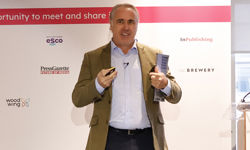"We are equally owned by media buyers, advertisers and publishers. We sit right in the middle, so my allegiances are just as much to P&G as to IPC. In fact, I think I’ve been criticised by both."
So says Chris Boyd, the congenial outgoing chief executive of ABC, who retires this October after eight years in the role. And what an eight years it’s been. Media-wise, he’s witnessed the explosion of the internet and other digital platforms, the arrival of category-defining magazines such as Glamour and Nuts, and advertisers grasping that they need to engage with audiences rather than paint-ball them with messages.
In at the deep end
And ABC has also changed over the last eight years. When Boyd inherited the hot-seat, the media auditing body was in a somewhat sorry state. The organisation was still reeling from the Trinity Mirror scandal of November 1999 when it transpired that the regional newspaper group had inflated the circulation figures of three titles. ABC undertook a month-long investigation and admitted that its auditing – which in this case had been outsourced - had not been as robust as it could have been. "It was a big, earth-moving event," reflects Boyd, whose chief priority very promptly became injecting some rigour into the auditing process to avoid such catastrophes in the future.
Talk about a turnaround. On a recent promotional DVD for ABC, it is described in glowing terms by a cross-section of representatives from its three industry stakeholder sectors. Typical descriptions include "a lighthouse in the storm of communication" and "a kitemark". "Without it [ABC], they [advertisers] are flying blind," says ISBA’s Bob Wootton. "It gives our business authority, integrity and trust," says Incisive Media’s CEO Tim Weller.
Industry stalwarts will know only too well that ABC’s reputation was not always thus. It was launched in 1931 as an aid to stamp out overblown circulation claims: prior to ABC, Fleet Street used to trumpet its own circulation figures which implied that everyone in the country was reading eight daily newspapers. ABC was brought in to give advertisers reliable, third party data on which they could depend. However, Trinity Mirror showed beyond a shadow of a doubt that there were flaws in the process which had been there for some time and which dented ABC’s trustworthiness.
Holding the line
ABC’s image revival has had much to do with Boyd’s dedication to making it a more reliable source of information. "What I’ve done - as part of a team of six directors - is to raise standards. People now know that if they do something that breaks the standards that are agreed by media owners, buyers and advertisers, we’ll discover it and get them to put it right. In years gone by, there was a tendency to let things go." He adds: "You just can’t have a standard in which people believe if you constantly let things go."
As well as auditing print – specifically all national and large regional newspapers and almost 1,500 consumer and business-to-business magazines - ABC also audits websites through ABC electronic (ABCe). Often, these websites are extensions of an existing print brand but increasingly they are pure-plays. Digital technology has meant that ABC now finds itself extending into other platforms too. "Our remit grows and grows," says Boyd. "We’re now getting into the mobile sector too, setting mobile metrics and standards, and are also involved with measuring online radio and TV."
Non-partisan
Regardless of ABC’s ever-expanding remit, Boyd insists that the organisation can only be successful if it is non-partisan. "The only way you can do this job is if you are absolutely straight and not into politics," he insists.
In 2005, ABC leveraged its middle-man positioning to unite media buyers and sellers in person to consider the changes that would shape the industry over the coming years. "Masses of interesting insights came out of those sessions which really set the strategy for the next few years," remembers Boyd. He, for one, was genuinely surprised to learn during those sessions that all sectors within the media industry were calling for ABC to take more of a lead. "This is a difficult thing for us. If we were to lead too much, we’d be smacked down, so normally we don’t give any opinions on what ought to be done. But this almost gave us a vision to lead because everyone was saying how much more complicated the market was becoming because of convergence and fragmentation, and how much they wanted to prove accountability and ROI to clients."
Multi-platform certificates
This was particularly well illustrated by the issue of how to show how a particular media brand was performing across a variety of platforms. Instead of adding together web traffic figures to circulation figures ("that’s like adding together apples and elephants - completely meaningless"), ABC devised a Group Product Report which lists an audited magazine or newspaper circulation next to audited exhibition traffic and audited web traffic and so on. "Anything that we have audited can go together on one certificate," says Boyd. "That’s been a catalyst for more publications wanting to have their sites audited. They can then say to their advertisers, "OK, our print sales are down but our unique users are up" and that enhances the way they sell – which, increasingly, is one department selling across lots of different platforms." The reports have been very popular among national newspapers and are now starting to be used by business titles too: entertainment trade weekly the Stage became the first B2B title to have its web and print circulations printed side by side in a Group Product Report in April.
ABC & NRS
So, how would such a report work alongside other data? To anyone who is unfamiliar with the media planning and buying process, ABC figures are quantitative and used for buying media while NRS figures are qualitative and used for planning. Boyd’s personal view is that the NRS and the ABC should be more centralised. "To have some overall strategic management would be a sensible route," he says. Certain stories in the marketing press have suggested that a joint CEO will be appointed as both Boyd and the NRS CEO Roger Pratt are stepping down later on this year. Boyd is tight-lipped on any actual developments in this area, choosing only to comment: "There are just conversations about conversations at this moment in time because, as you can imagine, it’s very political."
Certainly, Boyd feels that the NRS currently suffers from an image problem, which perhaps could be improved by being more closely aligned to ABC. "I’m not an expert in research, but the way the NRS does research is incredibly robust. However, NRS figures are always an estimate and estimates go up and down. People can’t argue about ABC figures but they can with readership figures, so as soon as you get people criticising the NRS, it destabilises it." He adds: "I don’t like seeing the NRS being shot at."
Advertiser needs
And it’s vital for the future of the media industry that ABC – whether with or without NRS - accommodates the existing as well as the evolving needs of advertisers. The perennial challenge is understanding exactly what they want. Buying media space in print is straightforward, but digital media have changed the rules of the game. Boyd reflects on the heady days of dotcom madness at the start of the new millennium. "It was like the wild west. Agencies were quite happy to put £50,000 up front, yet they’d never do that in press or TV. One of our roles was to educate and Richard [Foan, head of ABC electronic] has done a brilliant job with that."
To meet growing demand from advertisers and media agencies for detailed data, ABC has just introduced ‘optional monthly reporting’ for consumer magazines, which enables titles to report monthly or issue figures so that advertisers can see where the spikes are. (B2B certificates already show these figures.) This can be a particularly useful breakdown for magazines which use cover-mounts to help boost sales, because advertisers can see first-hand how much of a difference giving away a bag or a pair of flip-flops has made to sales. Questions about how the frequency of reporting requirements may evolve are met with can-do spirit from Boyd. "We can produce hourly or annual data – whatever the industry wants, we’ll do it. We are working with the industry so we can help deliver what they want, but no one really knows what they want. So the aim for now is to make all the data clearly available and easy to use."
Despite all the doom-mongering about print, Boyd is upbeat about its future. "It’s still a very exciting industry; talk about the death of print is ridiculous. Circulations are generally moving downwards but that’s because so much else is going on and people don’t have the time that they used to have to read, and they’re getting their news and entertainment in lots of different ways. Media companies are having to evolve at such a speed. The ones who are doing really well are the ones who understand where they’re going but there will be some that fall by the wayside. I find it interesting to watch these companies evolve from being traditional print publishers into cross platform media organisations and sometimes even going out of media altogether. Companies with a real strategic focus about where advertising’s going will win. At the moment, everything’s about how you talk to consumers, but have any media owners really mastered how to engage advertisers?"
Boyd, who worked at IPC for 28 years in a variety of advertising sales roles prior to joining ABC, has no definite plans for his retirement come October, apart from intending to complete an Open University Social Sciences degree, walking, and spending more time at his home in Kent. He’s not exactly ruling out staying in the industry, but only if the right part-time, non-executive position came up. "I’m not setting myself up as a consultant, but if someone wanted me to do something that I felt I could do, then I’d consider it."
Looking back over his stint at the helm of ABC, he says: "When I took it on, I thought I’d do it for a year or two. I have enjoyed it so much more than I thought I would." Clicking his fingers, he says: "Eight years has just gone like that."
FEATURE
Chris Boyd - interview
There are few more central roles in UK media than that of chief executive of the ABC. Chris Boyd has occupied that position for eight years, during a period of tumultuous change in the industry. Chris steps down in October and, here, he tells Lucy Aitken about the highs and lows of his time in charge.










